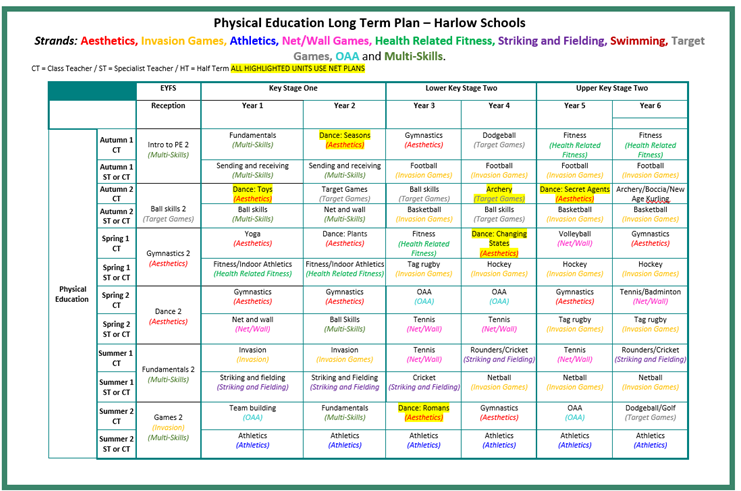PE
Purpose and Aims
At Jerounds Primary Academy, the purpose of our Physical Education curriculum is to provide all pupils with high-quality learning experiences that develop physical competence, confidence, and a lifelong enjoyment of being active. We aim to nurture the health, well-being, and personal development of every child, equipping them with the skills, knowledge, and attitudes to lead healthy and active lives.
Our PE curriculum is designed with the following key aims:
- Develop Physical Competence – To ensure pupils acquire a broad range of fundamental movement skills and the ability to apply them effectively across different activities and sports.
- Promote Health and Well-being – To encourage pupils to understand the importance of physical activity for maintaining a healthy lifestyle, including fitness, nutrition, and mental well-being.
- Foster Personal and Social Skills – To support the development of resilience, teamwork, leadership, and fair play through structured and collaborative activities.
- Encourage Lifelong Participation – To inspire a love of physical activity and motivate pupils to continue participating in sport and exercise beyond school.
- Provide Inclusive Opportunities – To ensure that all pupils, regardless of ability or background, have access to meaningful and engaging physical experiences that challenge and support them appropriately.
By combining a structured curriculum, enrichment opportunities, and a focus on personal development, we aim to cultivate confident, motivated, and healthy learners who value and enjoy physical activity.
Based on the National Curriculum,
Key stage 1 pupils should be taught to:
- master basic movements including running, jumping, throwing and catching, as well as developing balance, agility and co-ordination, and begin to apply these in a range of activities
- participate in team games, developing simple tactics for attacking and defending
- perform dances using simple movement patterns.
Key stage 2 pupils should be taught to
- use running, jumping, throwing and catching in isolation and in combination
- play competitive games, modified where appropriate [for example, badminton, basketball, cricket, football, hockey, netball, rounders and tennis], and apply basic principles suitable for attacking and defending
- develop flexibility, strength, technique, control and balance [for example, through athletics and gymnastics]
- perform dances using a range of movement patterns
- take part in outdoor and adventurous activity challenges both individually and within a team
- compare their performances with previous ones and demonstrate improvement to achieve their personal best
Organisation of the curriculum
At Jerounds Primary Academy, our PE curriculum is carefully organised to provide a coherent, progressive learning journey from Early Years through to the end of Key Stage 2. Each year group from year 1-6 completes 12 units over the course of the year. This equates to two units each half term. We ensure that every stage of learning builds on prior skills, knowledge, and understanding, enabling all pupils to develop confidence, competence, and a love of physical activity.
Early Years Foundation Stage (EYFS):
In EYFS, pupils begin their journey by developing the fundamental skills of PE, focusing on basic movement, coordination, balance, and spatial awareness. Through engaging play-based activities, children are encouraged to explore different ways of moving, learn to control their bodies, and develop confidence in physical activity. These early experiences lay the foundation for more structured learning in later years. In EYFS PE is taught discreetly weekly and continuously through our provision.
Key Stage 1:
In Key Stage 1, pupils build on these fundamentals, developing skills in a range of activities including gymnastics, dance, games, and athletics. Emphasis is placed on mastering core movements, developing coordination, and beginning to understand the importance of teamwork and fair play.
Key Stage 2:
In Key Stage 2, pupils consolidate and extend their skills across a wider variety of sports and physical activities. They engage in more complex games, team challenges, and individual pursuits, while developing tactical understanding, resilience, and leadership. Opportunities for intra- and inter-school competitions further enhance motivation and enjoyment.
At all stages, our PE curriculum is underpinned by the Get Set 4 PE scheme, ensuring clear progression, inclusive learning, and a structured approach to skill development. Lessons are designed to be engaging, differentiated, and aligned to national curriculum expectations, supporting pupils to achieve their personal best in a safe and supportive environment.
Each unit of work is linked to strands which are repeated in each key stage to support retention and progress within PE.

Enrichment
At Jerounds Primary Academy, we recognise the power of physical education and sport to enrich pupils’ lives beyond the classroom. Our enrichment offer is designed to broaden experiences, inspire ambition, and foster a lifelong commitment to health and well-being.
Through a carefully planned programme of extra-curricular activities, clubs, and competitive opportunities, we aim to provide every pupil with the chance to participate, achieve and excel. Our enrichment provision supports the development of physical competence, teamwork, leadership, and resilience — skills that extend far beyond the sports field.
We are proud to offer play leaders, who actively support and encourage younger pupils during playtimes and lunch breaks. This initiative promotes leadership, responsibility, and peer mentoring, while providing engaging, structured opportunities for all pupils to be active.
Also, we work in partnership with local schools, community clubs and sporting organisations to offer a wide range of opportunities, from traditional team sports to individual pursuits. These experiences encourage pupils to challenge themselves, discover new interests, and build confidence through participation.
Enrichment in PE is not solely about competition; it is about creating meaningful experiences that develop character, promote inclusivity, and nurture a sense of belonging. We are committed to ensuring that all pupils, regardless of ability or background, have access to high-quality sporting opportunities that inspire and empower them.
Planning and Assessment
At Jerounds Primary Academy, we use the Get Set 4 PE scheme to ensure a well-structured, progressive and inclusive approach to the teaching and learning of physical education. This high-quality scheme provides a clear and consistent framework that supports effective curriculum design, ensuring all pupils experience a broad and balanced range of physical activities throughout their school journey.
Our planning is carefully sequenced to build knowledge and skills year on year, enabling pupils to revisit, refine and deepen their learning over time. Lessons are designed to be fully inclusive, offering appropriate challenge and support so that every child can participate and make meaningful progress.
Assessment is embedded throughout the curriculum. Using Get Set 4 PE, teachers are able to track progress against clear learning objectives and success criteria. Formative assessment strategies — including observation, questioning, and peer and self-assessment — are used to inform daily teaching, while summative assessments provide a structured overview of pupil attainment and development.
This approach ensures consistency, high expectations, and a strong focus on progression. By combining expert teaching with a robust planning and assessment framework, we aim to equip pupils with the skills, knowledge and confidence to enjoy physical activity and lead healthy, active lives.

 Jerounds
Jerounds